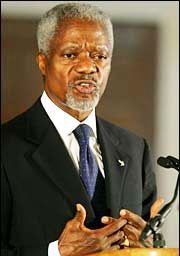Escalation of violence in Sudan’s Darfur threatens peace talks – Annan
Oct 21, 2005 (NAIROBI) — The escalation of violence in Sudan’s Darfur region may threaten peace negotiations in the Nigerian capital of Abuja, and the international community needs to apply concerted pressure to reach a successful outcome, UN Secretary-General Kofi Annan said in his latest report on the strife-torn region.
 “The frequency and intensity of the violence committed by the Sudanese Armed Forces and the Popular Defence Forces, government-aligned tribal militia and the armed movements – including in particular the Sudan Liberation Movement/Army [SLM/A] – reached levels unseen since January 2005,” Annan said in the report to the UN Security Council.
“The frequency and intensity of the violence committed by the Sudanese Armed Forces and the Popular Defence Forces, government-aligned tribal militia and the armed movements – including in particular the Sudan Liberation Movement/Army [SLM/A] – reached levels unseen since January 2005,” Annan said in the report to the UN Security Council.
“Because of the urgency of the present situation, the international community’s efforts must be immediate, coordinated and determined,” he said.
He urged the international community to put “decisive and concerted pressure on the parties” to the conflict.
The sixth round of African Union-mediated talks, which adjourned on Thursday until 21 November, were hampered by the escalation of violence in the region, divisions among the rebel leadership and deteriorating relations between Sudan and the AU.
The government’s record was troubling “because of the evidence that its forces triggered some of the incidents, and because there are clear indications that, in many cases, the tribal militia operated with enabling support from the government,” Annan said.
He added that the SLM/A also instigated a significant number of attacks and shared some responsibility for the deterioration in security.
The AU also expressed its concern regarding the worsening security situation on Thursday as it renewed its mandate to monitor the ceasefire between the rebels and government forces until 20 January 2006.
Five Nigerian peacekeepers were killed in an attack blamed on commanders of a dissident faction of the military wing of the SLM/A, which initially opposed the dialogue.
During the closing ceremony of the Abuja peace talks AU Special Envoy and Chief Mediator Salim Ahmed Salim acknowledged that only modest progress had been made during the latest round of negotiations.
In an AU statement, he reiterated his commitment to make the next round a decisive one and expressed his intention to undertake extensive consultations with all the stakeholders prior to the resumption of the negotiations in November.
Although three negotiating commissions discussed power sharing, wealth sharing and security arrangements, much of the progress was made on technical and procedural points rather than substantive issues.
On power sharing, the parties reached agreement on human rights and fundamental freedoms as well as on criteria and guidelines for power sharing. They also agreed upon a 10-point agenda for discussions on wealth sharing during the next round of talks. Consultations on the issue of security arrangements were informal.
In a statement, the parties to the conflict – the Sudanese government and the two rebel groups, the SLM/A and the Justice and Equality Movement (JEM) – reaffirmed their determination to use the intervening period between the sixth and seventh round, to consult widely with their various constituencies in order to resolve internal disputes and be better prepared for the final phase of the negotiations.
Abdul Waheed Al-Nur, chairman of the SLM/A, acknowledged that his rebel group had internal problems and apologised for the difficulties it had inflicted on the peace process.
“We shall not bring our internal problems to the negotiating table again,” Deutsche Presse-Agentur, a German news agency, quoted him as saying.
The parties also expressed their readiness to address the outstanding problems that had undermined the pace of the negotiations during the last round of talks. Foreign Minister Lam Akol said the next round of peace discussions would include members of the southern Sudanese People’s Liberation Movement/Army (SPLM/A) and a new joint government position, Reuters news agency reported.
Akol, a southerner, was appointed as part of a new coalition government between Khartoum’s ruling National Congress Party and the former rebel SPLM/A.
“This is a crucial moment for Darfur and no time must be lost,” Annan said.
The Darfur conflict erupted in February 2003 when the two main rebel groups, the SLM/A and the JEM, took up arms to fight what they called the discrimination and oppression of the region by the Sudanese government. The government is accused of unleashing militia – known as the Janjawid – on civilians in an attempt to quash the rebellion.
Some 3.3 million people continue to be affected by the conflict, according to the UN, of whom 1.8 million have been internally displaced and 200,000 have fled to neighbouring Chad.
(IRIN/ST)
